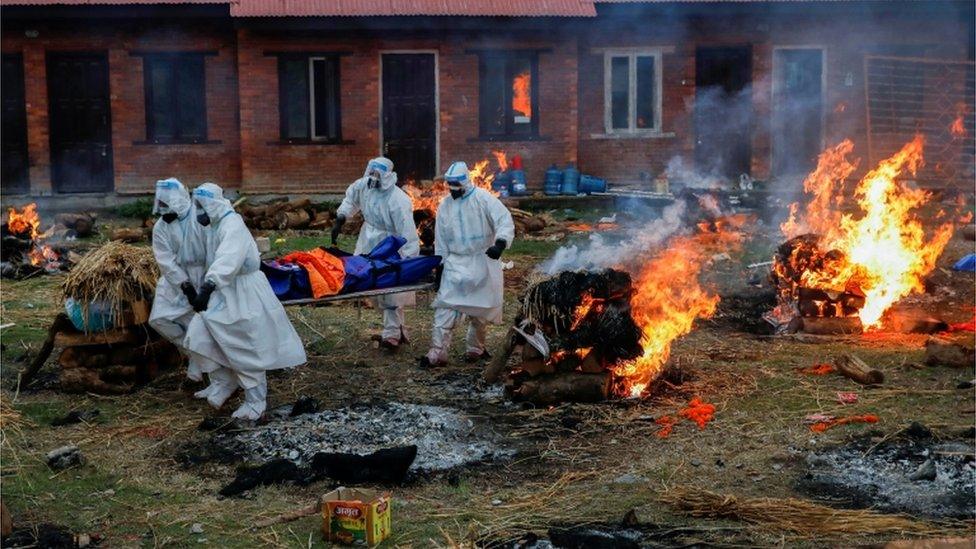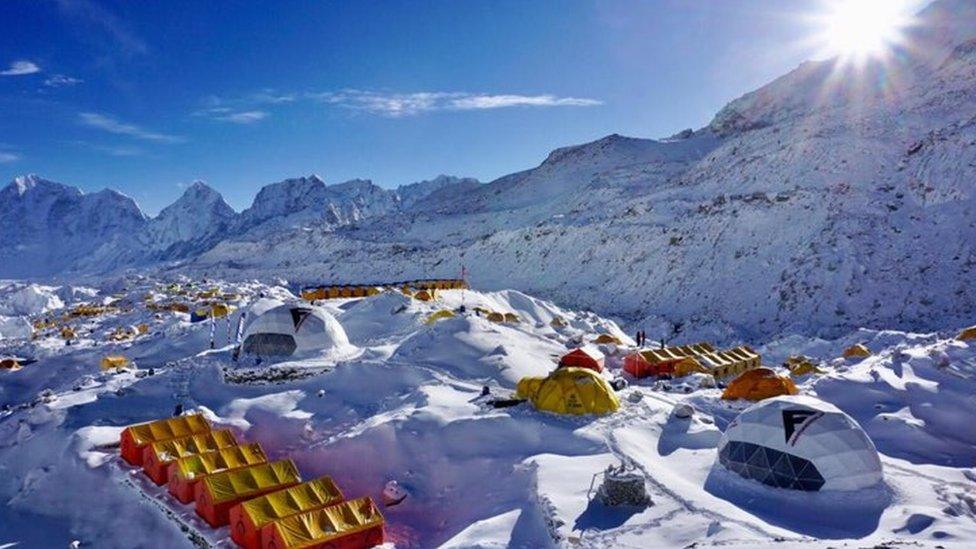Nepalese PM calls on UK to provide vaccines as cases surge
- Published
Nepalese prime minister calls on UK to provide Covid vaccines
Nepal's prime minister has made an urgent plea for vaccines to his UK counterpart Boris Johnson, as the Himalayan nation experiences a devastating second wave of coronavirus.
Speaking to the BBC, KP Sharma Oli said it was Britain's responsibility given the historic ties the nations share.
Mr Oli said the sacrifices of Nepal's Gurkha soldiers serving the UK should make Nepal a priority for UK Covid aid.
Nepal reported a high of 9,000 daily infections last month.
"I want to convince the UK Government, particularly Prime Minister Boris Johnson, about the situation in Nepal and how we are suffering," Mr Oli said.
Nepal, which has one of the highest rates of positive tests in the world, saw a surge of cases in May, recording more than 4,000 deaths over the course of the month.
Like its neighbour India, Nepal has struggled with shortages of beds and oxygen supplies. The situation has eased recently in places like the capital Kathmandu, but the virus is now spreading in rural areas.
Relatives in Nepal have been forced to say goodbye through crematorium gates
At the start of February, Nepal was reporting around 100 daily cases, but by early May that figure had jumped to as many as 9,000 daily infections. A national lockdown which began in April remains in place but many say it came too late.
The country's borders with India remain open. Critics say that failing to close them allowed the Delta variant detected in India to spread quickly into Nepal as migrant workers returned home.
The Himalayan country has received some international aid, including 260 ventilators and 2,000 PPE kits from the UK. But Mr Oli said it was vaccines he needed. Fewer than 3% of Nepal's population of 30 million has been fully vaccinated.
"If we vaccinate people, then we can control Covid-19, otherwise it will be hard for us," Mr Oli said.
Nepalese authorities have ordered supplies from China, but many elderly Nepalis who received their first dose of the Astrazeneca jab are now unable to get their second, after supplies promised from India were delayed because of the crisis there.
Prime Minister Oli said he was making the direct appeal to the UK, as Nepal's "oldest friend".
"The Gurkhas have served the UK for many years, keeping their lives at risk," he said. "People who are serving in Britain have their families in Nepal. So that is a very deep connection."
A spokesperson for the UK Foreign Office told the BBC it "stood shoulder-to-shoulder with Nepal during this pandemic" and was "one of the first countries to send health experts and life-saving medical equipment to Nepal".
"The UK is a leading donor to COVAX, the international initiative to procure and distribute vaccines equitably," the spokesperson added. "We have committed £548 million to the scheme that will provide more than a billion vaccines to developing countries, including Nepal, this year."

Nepal recorded 4,000 coronavirus deaths in May as case numbers surges
Mr Oli said his country's foreign minister had spoken to UK counterpart Dominic Raab to discuss the issue, but he was trying to establish direct telephone contact with Mr Johnson.
The appeal to the UK comes as the US has announced it will send vaccines to Nepal as part of a donation of 7 million doses to Asia.
Mr Oli has faced criticism of his handling of the pandemic and for failing to take the virus seriously. He previously claimed that it could be washed away by gargling guava leaves and turmeric, and said Nepali's have stronger immune systems because of their diets.
Last month, as case numbers were rising sharply, he said the situation in Nepal was "under control".
Prime Minister Oli, who remains in power after a recent vote of no confidence, also drew criticism for holding mass political rallies earlier this year as MPs in his own party withdrew support for him.
Related topics
- Published5 May 2021

- Published5 July 2022
